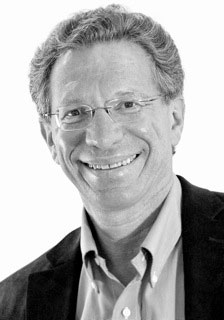
To learn what's going on in the schools, the public looks to news media to be its tutor.
But how good an education about education are we getting in an age of thinning newsrooms and the flourishing of digital media?
And how can educators themselves be more effective voices in the public debate over where schooling should go?
A perfect person to ask is Louis Freedberg, who speaks at UBC next Wednesday at an event co-sponsored by The Tyee.
Freedberg covers education for the new online venture California Watch, a project of the non-profit Center for Investigative Reporting in Berkeley, California.
"Non-profit Internet media have a crucial role to play during this transitional phase, as old media transform themselves -- or die out -- and new online content and distribution platforms emerge," says Freedberg.
"But the level of funding available will never be substantial or stable enough to provide the level of substantive reporting that is essential in a democratic society.
"That means that people who care about public policy issues like schools can't wait for a miraculous rebirth of journalism. They'll have to develop their own ways to get their issues discussed in the public square and how to mobilize people to act -- in concert with existing and emerging journalism organizations, but not exclusively so. Fortunately, new digital media tools provide opportunities to do just that that never existed before."
Decades of experience
Freedberg is a digital pioneer, no doubt, but also an old hand at old media. He founded the Youth News radio project in the San Francisco Bay area more than a quarter century ago, and was a lead reporter and editorial board member for the San Francisco Chronicle before leaving to co-found California Watch. Freedberg has a PhD in cultural anthropology, covered the revolution in South Africa (the country of his birth) and served as the Chronicle's Washington, D.C. correspondent.
California Watch is a recently launched non-profit that distributes reports to newspapers and other media all over the state, as well as publishing on its own website. But education has long been a favourite beat for Freedberg, who has piled up three decades worth of in-depth explainers and major news breakers about school policy and politics.
In conversation with Tyee journalists
At the Wednesday event, Freedberg will converse with Tyee editor David Beers and Tyee education reporter Katie Hyslop about such questions as how academics and other educators can succeed in getting their facts and ideas across to the media, how the Internet is changing civil society's ability to discuss complex policy issues, and what California's stressed education system has in common with challenges faced here in B.C.
"California might benefit from learning from B.C.," says Freedberg. "We need all the help we can get, and the state is hardly a model for anything at the moment. What's most important is to try to get the conversation focused on education reforms affecting the majority of students, rather than on reforms that seem to get most attention such as charter schools or dealing with the small percentage of teachers who are ineffective -- issues that really only affect a minority of students."
Freedberg emphasizes that educators have a great opportunity to shift the conversation, if they know how to tap into it. "They have to explain their research more clearly, in ways the public can understand, especially anything involving complex statistical techniques," he advises.
"They need to engage more directly with journalists themselves who are writing on these issues," he says.
Perhaps most important, however, they shouldn't wait for reporters like Freedberg to get in touch. "People who want to create positive change in education need to think about how to create online platforms so they can reach policy makers more directly, without having the media as the mediating link."
Come join in the conversation -- free of charge -- as Louis Freedberg discusses these issues and more at the Liu Centre Multipurpose Room on the UBC campus at 5 p.m. on Wednesday, March 16. The Liu Centre is at 6476 North West Marine Drive. Here is a map to guide you.
Louis Freedberg's appearance is part of a UBC Green College series -- "Translations: Academic-Media Engagements in the 21st Century" -- co-sponsored by the Department of Educational Studies in UBC's Faculty of Education, and the UBC Graduate School of Journalism. This event in the series is co-sponsored as well by The Tyee. ![]()















Tyee Commenting Guidelines
Comments that violate guidelines risk being deleted, and violations may result in a temporary or permanent user ban. Maintain the spirit of good conversation to stay in the discussion.
*Please note The Tyee is not a forum for spreading misinformation about COVID-19, denying its existence or minimizing its risk to public health.
Do:
Do not: